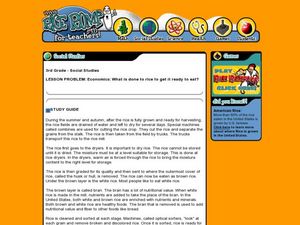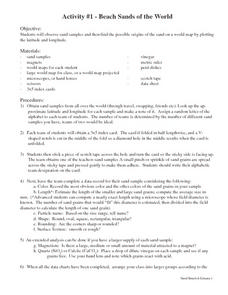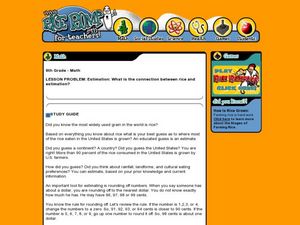Curated OER
Economics: What Are Some Other Uses for Rice?
Sixth graders investigate ways rice is sold by creating a chart of the different rice foods. In this economics lesson, 6th graders examine their local food store and list at least 10 rice by-products in a class chart. Students discover...
Curated OER
What was the lesson learned in the story, "One Grain of Rice?"
Second graders complete activities with the folktale "One Grain of Rice." In this folktale lesson, 2nd graders discuss the lesson learned in the story. They also tell character traits of the main character Rani.
Curated OER
Clothes from Grain: A Miracle or a Problem?
Students read fables about entrepreneurs who buy grain and turn it into clothing, or resell the grain and use the proceeds to import clothing. They use the fables to determine why people trade, and to analyze costs and benefits of trade...
Curated OER
Botany: What are the types of rice?
Students explore the different types of rice. In this botany activity, students match characteristics of rice with its variety.
Curated OER
Russia burns: Moscow under smog: Grain export ban
Tenth graders examine the problems that the 2010 heat wave caused in Russia. In this Russian Weather ESL lesson, 10th graders read an article and answer guided reading questions. Students complete an article quiz on what they have...
Curated OER
Food Detectives
Students investigate the regions in which particular grains are grown. Using the packaging from a variety of foods, grains are identified and the general locations where they are grown are plotted on a map.
Curated OER
Economics: What are ways that rice can be used?
Second graders examine the uses of rice. In this social science lesson, 2nd graders list and draw pictures of five ways people use rice.
Curated OER
Come Into my Parlor
An interesting cross-curricular lesson on dairy farming awaits your students. Elements of language arts, math, social studies, and agriculture are all present. Many excellent worksheets and a good article on dairy farming are included in...
Curated OER
The Indian Subcontinent Since 1947: The Legacy of Independence
An exploration of Indian and Pakistani cultures and conflicts throughout the 20th - 21st centuries, this presentation features relevant political cartoons and poignant photos to illustrate the breadth of politics in India and Pakistan....
Curated OER
Economics: What is done to rice to get it ready to eat?
Third graders create a map showing the journey of rice from the field to the grocery store. In this agriculture lesson, 3rd graders discover and map the process of harvesting and preparing rice to be packaged and shipped to sell to...
Curated OER
What is Currency?
Students study the history of currency and the monetary system of historic Akan people, who lived on the Atlantic coast of Africa. This outstanding series of lessons is multi-disciplinary and contains many activities for different...
Curated OER
Where Does It Come From?
Learners explore where agricultural commodities used in snack foods are grown. They choose a snack food and locate the top five states that produce the food that the snack is made from.
Curated OER
The Tropical Supermarket
Third graders explore the sources of the various foods they eat. They examine how everyone is intricately connected to the ecosystems in which natural resources are produced. Students observe how the lives of people living in those...
Curated OER
Beach Sands of the World
Students examine a variety of sand samples from throughout the world. On an index card, they write the characteristics of the sand and draw what the grains look like to use during the activity. Using a map, they practice plotting...
Curated OER
A World in a Grain of Sand
Students go exploring Britain's beaches. In this geography lesson, students visit selected websites to learn about specific beach habitats and the history of cleaning those beaches.
Curated OER
What is the connection between rice and estimation?
Sixth graders investigate estimating. In this estimating instructional activity, 6th graders estimate how much rice is eaten around the world. Students estimate the percentages of rice eaten by other countries. Students compare rice...
Curated OER
Contributions
Students taste rice, one of the Nations first people's contributions. In this contributions lesson, students discover what rice looks like, feels like and tastes like. Students make recipes using wild rice.
Curated OER
The History of Money
In this social studies worksheet, students investigate the history of paper money and coins. Students read paragraphs about what early people used for money and what kinds of banks were used. Students complete a crossword puzzle.
Curated OER
Healthy Eaters
Students classify foods as "healthy" or "unhealthy" and sort foods into appropriate food groups. In this nutrition/physical education lesson, students play a game in which throwing skills are practiced. Pictures of food are sorted into...
Curated OER
Altered Genes
Learners describe the economic relationship between farmers, consumers, and food companies. They examine the issues regarding the reactions of consumers in this country and other countries to the use of gene-altered crops in food...
Curated OER
What Shape Is Money? Money Doesn't Have to Be Round or Rectangular
Students explain that many kinds of objects have been used as money. After identifying qualities that make a good currency, they design a nontraditional currency and decide on its value.
Curated OER
Farming: Seasons on a Wheat Farm (Lesson 4)
Students explain the seasons on a wheat farm. They identify the uses of a grain elevator as well. They use a dry erase board to illustrate the seasons and the grain elevator in operation.
Curated OER
Bake, Boil, or Fry
Students write a journal entry about where there food comes from. In this Civil War lesson, students discuss journals, the crops grown within the U.S., the import/export process and what food preparation must have been like on a...
Curated OER
Why Do Geese Fly South For the Winter?
Fifth graders examine migration by tracing animal migration routes on a map. In this animal life lesson, 5th graders observe a map of North America and read about the migration patterns of geese. Students trace the path most...























